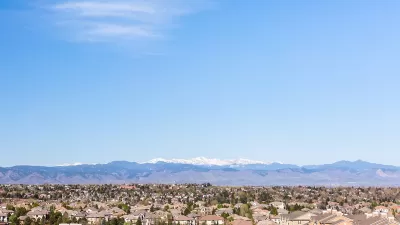No drastic changes will occur in American suburbs over the next quarter century, Columbia University professor contends.
In a paper prepared for the Robert A. Catlin Memorial lecture at the Edward J. Bloustein School of Planning and Public Policy at Rutgers University in New Jersey, Professor Herbert J. Gans observed that the future of the suburbs is linked to the state of the economy; changes in the family, households, and related social institutions; the energy situation; and the spread of global warming. Nonetheless, he said, "the American Dream will remain focussed on the single family house and . . . people will continue to make sacrifices in the hope of spending a large part of their lives in one."
"Once the recession is over, and assuming it has not grown into a full scale depression," Gans said, "I imagine that the customary patterns will resume. As young families grow in size and income, many will again become home owners and move to lower density settlements. And many of them will wind up in new subdivisions built on cheap land beyond the last previous zone of such construction."
"Since few people live by economic rationality alone, more expensive gasoline will not produce a desire to live in the city or to move to a higher density suburban home even when it makes economic sense. I assume that, instead, daily commuters will buy smaller cars, perhaps in the least densely settled parts of the country as well."
Gans anticipated, however, experimentation with "popular and regionally variable new versions of New Urbanist planning all over the country." Still, he said, "the neo Greenwich villages associated with gentrification or with orthodox New Urbanism will not appeal to the middle class American mainstream."
"Although everyone is against global warming," Gans declared, "at this stage not many people are ready to seriously change their habits and lives, except in an emergency of the kind in which they have no choice."
"The reason is simple; global warming does not have sufficient and personal effect on anyone. Right now the glaciers are melting only on TV, and I am not sure whether people who are too young to think of the welfare of their grandchildren will sacrifice now to save them from 110 degree summers that might arrive when these grandchildren are adults."
FULL STORY: Imagining the Suburban Future

Alabama: Trump Terminates Settlements for Black Communities Harmed By Raw Sewage
Trump deemed the landmark civil rights agreement “illegal DEI and environmental justice policy.”

Planetizen Federal Action Tracker
A weekly monitor of how Trump’s orders and actions are impacting planners and planning in America.

The 120 Year Old Tiny Home Villages That Sheltered San Francisco’s Earthquake Refugees
More than a century ago, San Francisco mobilized to house thousands of residents displaced by the 1906 earthquake. Could their strategy offer a model for the present?

In Both Crashes and Crime, Public Transportation is Far Safer than Driving
Contrary to popular assumptions, public transportation has far lower crash and crime rates than automobile travel. For safer communities, improve and encourage transit travel.

Report: Zoning Reforms Should Complement Nashville’s Ambitious Transit Plan
Without reform, restrictive zoning codes will limit the impact of the city’s planned transit expansion and could exclude some of the residents who depend on transit the most.

Judge Orders Release of Frozen IRA, IIJA Funding
The decision is a victory for environmental groups who charged that freezing funds for critical infrastructure and disaster response programs caused “real and irreparable harm” to communities.
Urban Design for Planners 1: Software Tools
This six-course series explores essential urban design concepts using open source software and equips planners with the tools they need to participate fully in the urban design process.
Planning for Universal Design
Learn the tools for implementing Universal Design in planning regulations.
Clanton & Associates, Inc.
Jessamine County Fiscal Court
Institute for Housing and Urban Development Studies (IHS)
City of Grandview
Harvard GSD Executive Education
Toledo-Lucas County Plan Commissions
Salt Lake City
NYU Wagner Graduate School of Public Service



























